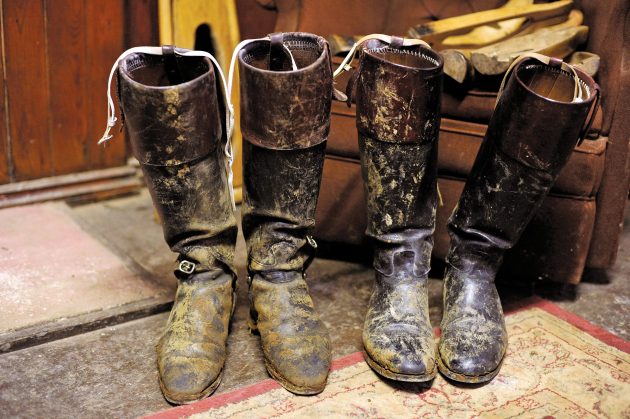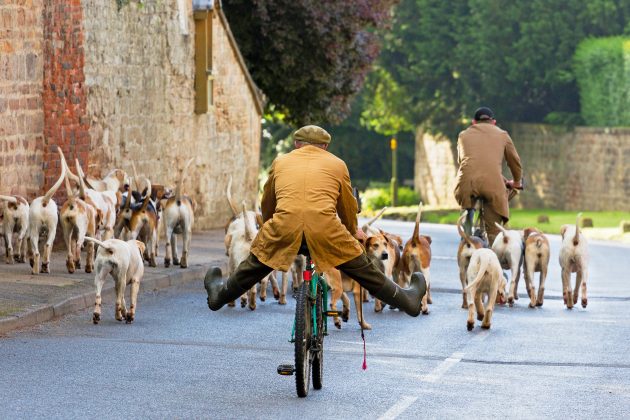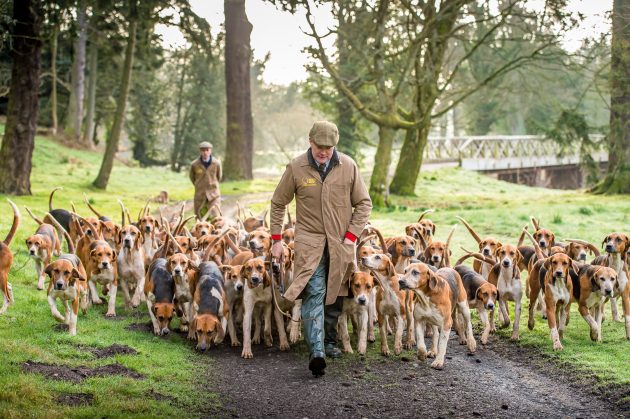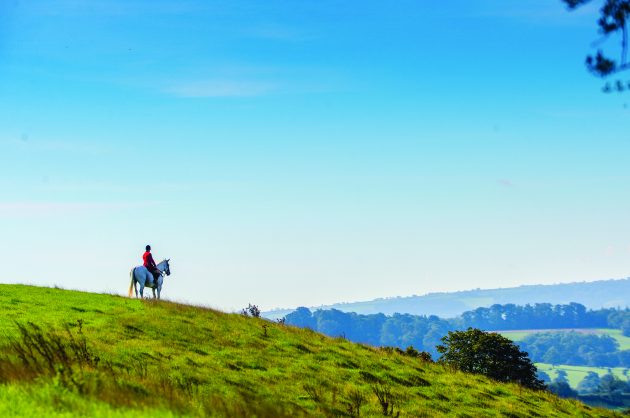Over the summer, hunts are a hive of activity: from horses and hounds to boots and buttons, everything must be shipshape for the Season ahead says Octavia Pollock
Have you looked at your boots since last Season? When did you last leave the ground? Have you spoken to the farmer whose rails got broken? Summer still has that sun-soaked feel of carefree months untroubled by early starts and endless mud, but whether you are hunt staff or an occasional follower, it is a crucial time for repairing and preparing, laying the foundation for a successful Hunting Season.

“People say ‘what do you do all summer?’” exclaims Percy huntsman Robert McCarthy. “There’s plenty to do, rearing three or four litters of puppies, grass to cut, painting, taking youngsters out on couples, staff on holiday, then before you know it horses are back in.” He walks hounds out twice a day, keeping them ticking over. “We start with a quiet April, but we never let them right down. The more hounds are out of kennels, the better. We might meet sheep or stop for a chat with a farmer – it all gets them used to things.”
The Percy are on bikes in May and horses at the end of July, a typical routine for building fitness. As Beckford says in Thoughts on Hunting, ‘in the two preceding months [before the Season], a pack is either made or marred’. It’s not all mileage, however: hound shows spangle a convivial calendar. “They generate more interest for everyone,” notes McCarthy. “We do Peterborough, Blaston, small shows… They showcase hound welfare, good PR.” The Percy were among the entries to the hunt-picnic competition at the Festival of Hunting, which, by the time this appears, I will have judged with this journal’s Editor. McCarthy assured me the Percy’s table would stand out, citing their tablecloths: the Union flags that fly above Alnwick Castle.

The competition is a way for hunts to gather their supporters to lay on a tremendous spread, echoing the puppy-show teas that set tables groaning. Such events take a lot of organising but they are essential for strengthening the links that hold the whole caboodle together. “We give all our farmers and landowners a big dinner or a lunch,” says Gaby Bull, Joint Master of the Kimblewick. “It’s nice to see them all when we’re not asking for something.” To ensure amiability in the Season, nothing is more important than taking the time to get to know the people whose land we cross. “You can’t expect farmers to welcome you if they don’t know you. They don’t rely on hunting any more; fallen stock is useful but otherwise why should they have us on a wet day in January? Everyone appreciates sitting down with a cup of tea and it’s so important to grow those friendships.”
PARTY TIME
Tea is welcome but no hunt is averse to letting its hair down and many a night has been danced away in field or barn, with ‘Pubs of the Month’ or barbecues on warm evenings. Summer parties are famous at the Bicester with Whaddon Chase. “We almost have too many,” admits Joint Master Will Dalton. “We make the most of the puppy-show marquee with a picnic ball afterwards and hold a garden party with a band or DJ. It appeals to the young farmers and gets everyone together, with the undertone that you’re raising funds for the Hunt.”

If you’re in need of some fresh air and exercise after a big night, few hunt staff will turn down an offer of help with building fences. Recently looking smart on Instagram were the South Shropshire’s new rails. “We patch up in winter, then go round the country building new gates, bridges, wicket gates and so on,” says huntsman Daniel Cherriman. “We generally find farmers accommodating; it’s mutually beneficial. We improve our access and can put in shortcuts to minimise disturbance.” Everything is provided locally, with timber from Nigel Farr of Westbury and donations of telegraph poles and railway sleepers. “We do them so they’re stock-proof, with wire hooked on if need be, and at a height that most people can jump. We have natural fences – hedges – to challenge people.”
To ensure you can fly those obstacles, a spot of preparation for both horse and rider is key. Former professional event rider Jo Aston realised that trying to help clients in the field was difficult, so began hunt clinics in Warwickshire, Oxfordshire and Gloucestershire. “I take up to 10 – it needs to be in a group, it’s not eventing,” she notes. “The best way for newcomers and people wanting to get their eye in is to practise outside hunting first. The day mirrors hunting, with coffee – or port – then very small stuff, small but precise. That’s where the magic happens. We break for port, then I’ll say ‘look up, hounds are running’ and shoot off, mimicking the real thing.” Hunt clinics benefit children too, even tiny tots, as Lynne Deakin of the Warwickshire Hunt Riding Club explains: “They learn the concept of gates, queuing for a fence, keeping room between people; something might sink in.”

If you don’t have your own horse, a good hireling is key and doing a hunt clinic on one first is the ideal way to get to know what’s available. Diana Jack, who supplies horses across the Midlands, runs clinics from mid-August to October and recommends them for both old hands and novices. “I get a lot of people new to hunting, which is enormously exciting,” she says. “They’ve never left an arena before, so practising ditches, slopes and mud ensures they’re not gobsmacked when they first go out.” Jack’s Motown is among her most popular hirelings, but many will fall in love with the first horse they try: “If they have a good day, they always want to go back.” Jack notes the importance of being ‘riding fit’ and someone who can help with that is personal trainer Ali Cooper, who works with the likes of top eventer Piggy March.
“I can always tell those who get in the saddle for the first time at the Opening Meet,” she reveals. “It’s so important for preventing injuries and being at one with the horse.” Hunting is hard work: “After a burst of galloping, people get breathless. I see so many people with sore backs. Building up muscle around joints makes it much easier.” Staying generally fit is best, so Cooper advises 20 minutes to strengthen core, legs and arms – squats, planks, press-ups – three times a week.
Hunting horses are the ultimate endurance athletes, capable of staying all day over fences and up hills, but it takes work. The giant hedges of the Blackmore & Sparkford Vale country are a big test, so groom Stacy Hodges starts her 10 staff horses slowly in June after they’ve had a decent rest. “They’ll begin on the walker for 10 minutes until they’ve got shoes on, then we’ll do a week of walking 20 minutes a day, then trotting at the end of July. The more roadwork the better; it hardens their legs and they have no problems with tendons.” Things start a bit earlier for the three that parade at the Bath & West: “We take ones we can trust.”
A SMART TURNOUT
‘It is for all of us within the range of our pockets to dress as well as we can out of compliment to the Master and the hunt,’ wrote RS Summerhays in Elements of Hunting (1938), which still holds true. Again, preparation is key. “It happens every September. People forget to put lavender balls in their coat pockets and the moths go to town,” reveals Richard Hume of The Hunting Stock Market. “Every Season, we have to replace 20 or 30 linings, most at the last minute.” Buttons, too, send people into a spin: “Thursday before Opening Meet, I get panicked calls from people who’ve forgotten to order new buttons.”

Of course, there’s always the surprise that things no longer fit. “Most people summer a bit too well,” reveals Bill Persse of the Hunting Shop in Rhondda, Wales. “Don’t wait to try on your coat and breeches until a couple of days before the start of the Season.” Persse reminds people to think of their hats too, especially if they ended the Season with a fall. For all leather and boot repairs, Calcutt & Sons in Hampshire is a top port of call. “There’s nothing we don’t do,” says manager Ian Compton. “Resoling, leather cases, horn cases, buttons. We’re the only manufacturer of horns in the country – I took one in today that looked as if someone had driven over it.” He will also repair flask cases and stocks secondhand flasks, so if a fall cracked your flask (horror!) Calcutts can help, or try Tack Again in Leeds, with all kinds of hunting ephemera. And there’s always eBay.
Hopefully, you spent the previous autumn making your own sloe gin to put in said flask. But if you’re unlucky enough to smash a bottle, as I did on a particularly distressing day, stock up from Foxdenton or The Oxton Liqueur Company. Few would dream of setting off without a mobile phone in their pocket today and various apps are worth getting, including What3Words for pinpointing a place more accurately than “near the tree behind the farm”, WhatsApp for live location sharing (excellent for finding second horses or monitors tracking antis) and Equilab to chart routes. More and more packs are improving their online presence, especially on Instagram. We know how adept our opposers are at manipulating social media. By putting out positive messages – happy hounds, alert horses, tiny ponies alongside thoroughbreds, smiling faces and well-maintained country – we can ensure our side is fairly represented, although be careful about identifying places or people.

Crucial to keeping everything going is helping those who campaign on our behalf, as Countryside Alliance campaign manager Polly Portwin urges: “It’s vital to support the campaigning work, from challenging police discrimination to, currently, amending the Online Safety Bill to make it an offence for anti-hunting activists to write fake reviews of businesses that support hunting.” The British Hound Sports Association, which is striving for high standards, needs backing too, says membership director George Bowyer: “We must show that we are a powerful rural lobby. Being a serious, well-managed association, with lots of members and financial support, is key to our future.”
The more prepared we are – in every sense – the stronger we are and the more enjoyable our hunting. Finally, remember how lucky we are to experience the best sport in the world. Pay your subs on time, talk to each other and smile. The butterflies will be fewer if you’re ready for the Opening Meet. After that, all that remains is to get out as often as you can and kick on.
HUNTING BLACK BOOK
The Hunting Stock Market (01264 810858, huntingstockmarket.com)
The Hunting Shop (01443 524090, thehuntingshop.co.uk)
Calcutt & Sons (01962 760210, calcuttandsons.co.uk)
Tack Again (01977 683369, tackagain.co.uk)
Ali Cooper Fitness (alicooperfitness.com)
Jo Aston Hunt Clinics (07968 316456)
Diana Jack hirelings (07778 333433)
Countryside Alliance (countryside-alliance.org)
British Hound Sports Association (bhsa.org.uk)





